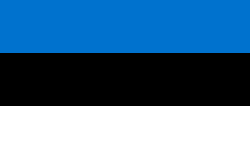The 2007 season was the sixteenth full year of competitive football in the Baltic country as an independent nation. The Estonia national football team played a total number of fifteen matches in 2007 and did not qualify for Euro 2008 in Austria and Switzerland. [1]
| Estonia | 3 – 0 | |
|---|---|---|
| Terehhov Leetma Viikmäe |
| 0 – 1 | ||
|---|---|---|
| Report | Vučinić |
| 2 – 0 | ||
|---|---|---|
| Al-Jassim Al-Qahtani | Report |
| 0 – 0 | ||
|---|---|---|
| Report |
| Estonia national football team results |
|---|
 |